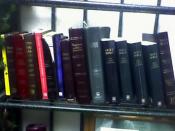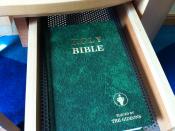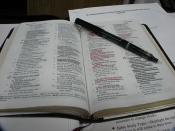Flood narratives are present in both the Sumerian epic of Gilgamesh and in the Bible and although they are very similar, they are also very different. The Sumerian version of the flood story is related to a polytheistic, antropocentric and fatalistic worldview, while the Hebrew myth is based on a monotheistic, theocentric and ethically casual worldview.
The big differences are evident already from the start of the stories. While in the Bible, God makes his sole decision about bringing down the flood, gods in 'Gilgamesh' must hold a council to decide:
"the gods in heaven decided in their council..." ('Gilgamesh' p. 63)
"And the Lord said, I will destroy man whom I have created..." (the Bible p. 11 ç7)
This is the first indication of the contrast between polytheistic and monotheistic worldviews. God in the Bible cannot hold a council as he does not have anyone to consult with. In 'Gilgamesh' gods cannot make sole decisions as they have limited powers and one god could not bring such a disaster on the men.
Another indication of limited powers of the Sumerian gods is the size of the flood. In 'Gilgamesh' only one city is flooded while in the Bible every living thing is wiped out all over the earth:
"the gods in heaven decided in threi council
to bring the flood down on the fortunate city." (Gilgamesh p. 66)
"And the Lord said, I will destroy man whom I have created from the face of the eart;" (the Bible, p. 11 ç7).
Another evidence of the difference between monotheism in the Bible and polytheism in 'Gilgamesh' is the difference betwen the tokens both survivours get in the end. While Utnapishtim gets a talisman all for himself and also become immortal - is accepted into the company of the gods, in...


